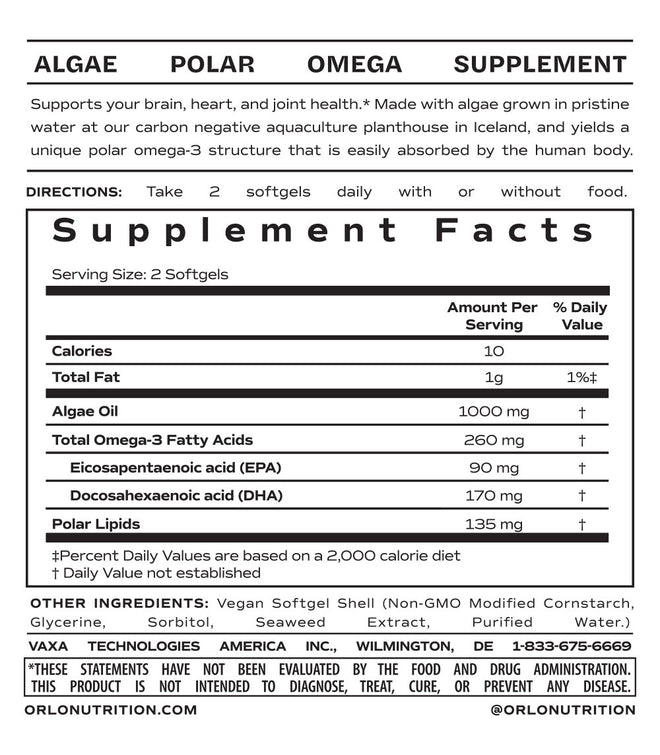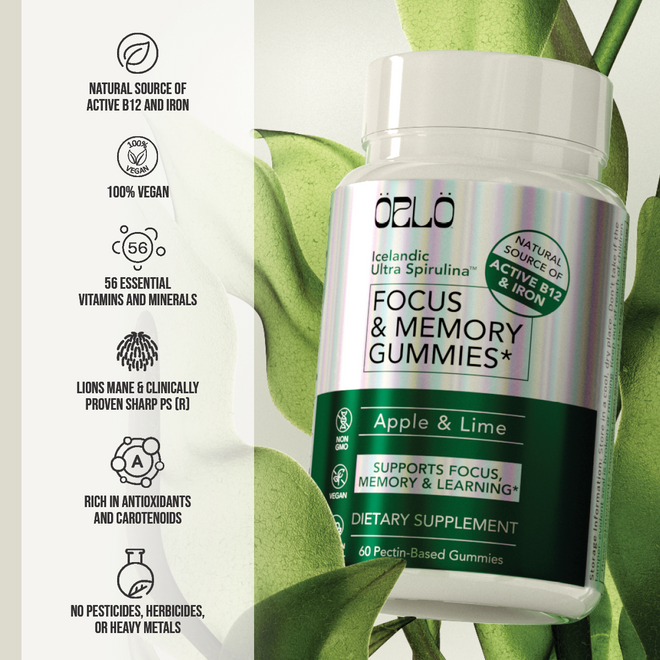Free shipping on purchases over $69
Why am I tired all the time?
Written by: Marci Clow, MS, RDN
Are you plagued by ongoing fatigue that makes it difficult to get up in the morning and make it through your day? If yes, then your body may be alerting you to a problem. It is normal to have bouts of tiredness now and again; however, chronic fatigue (lasting 6 months or more) is becoming more prevalent, with stress, certain health conditions, and lifestyle factors as some of the contributing factors. Feeling tired all the time is not normal, but you can reclaim your energy if you pinpoint why you feel fatigued and make some changes. This article will dive deep into common culprits contributing to fatigue and potential solutions for recharging your battery.

Discover our nutritional energy boosting solutions and you won't feel so tired anymore. Click to our store
What Are the Common Culprits of Fatigue?
The origins of fatigue can be multifactorial, but common contributors include lifestyle habits, underlying health conditions, and mental health concerns such as stress. Let’s take a closer look at each one.
● Lifestyle: Everyday habits, such as diet, exercise, and sleep routines, can greatly affect an individual’s level of fatigue. As discussed below, modifications to these lifestyle parameters can be game-changing when it comes to overall vitality.
● Underlying Health Conditions: It’s natural to feel groggy in the morning, but being constantly tired all day and for days at a time despite getting enough sleep may be a sign that there is an underlying issue that needs an evaluation from your healthcare provider.
● Mental Health Concerns: Processing life’s challenges, such as financial concerns, looking after children, loss of a loved one, and even the day-to-day stress of today’s fast-paced lifestyle, can exhaust your energy and derail your well-being, contributing to mental health challenges like depression and anxiety.

How Do I Identify the Source of My Exhaustion?
If you’ve been feeling like you are tired all the time and you are unsure why, it could be time to self-reflect on factors that may be contributing to your lack of energy. Both physical and mental symptoms might be indicators as to what is causing your waning energy level. For example, a person with physical fatigue may find it challenging to do regular physical activities, such as climbing stairs or getting out of a chair. Someone with symptoms of mental exhaustion might find their mood unstable, it is harder to concentrate, or it is difficult to make decisions. Additionally, mental fatigue can manifest in physical symptoms such as difficulty sleeping, upset stomach, or even over- or under-eating or gravitating toward unhealthy food choices.
A good way to initiate the identification of possible contributors is to keep a journal. Chronicling your energy level at various times throughout the day with how long you slept the night before and how often you woke up, the timing of meals, engagement in physical activity, and other details of daily activity could help pinpoint sources contributing to fatigue.
Recharging Your Battery: Do You Need to Tweak Your Lifestyle So You Don’t Feel Tired All The Time?
Everyday lifestyle habits can make a big difference in energy levels. A phrase thrown around somewhat frequently is the “3 pillars of health (or wellness), ” which, according to the National Sleep Foundation, includes nutrition, exercise, and sleep. Regardless of specialty or type of healthcare, most wellness practitioners would likely agree that these 3 lifestyle elements influence virtually all aspects o a person’s health, particularly their energy level or lack thereof. Let’s explore each of these in more detail.
● Nutrition: Eat a wide variety of foods and stay hydrated. Ever heard the saying, “Garbage in, Garbage out”? In the sense of energy levels, what you fuel your body with is certainly related to feeling more energetic and less tired all the time. Just like high-octane fuel keeps our cars running smoothly, a healthy diet with a wide variety of “real” foods like fresh fruits, vegetables, whole grains, and lean proteins will allow our bodies to function optimally and reduce the risk of fatigue. Nutrient-dense foods combined with complex carbohydrates, healthy fats, and/or protein are essential. The protein or healthy fat will keep you full and delay the absorption of carbohydrates into your bloodstream, plus the carbohydrates will give you an energy boost.

Dehydration can cause fatigue, so staying hydrated is important to keep your body functioning optimally. It may be tempting to reach for caffeine- and sugar-laden drinks; however, the best beverage for the task is simply plain water regularly consumed throughout the day to help sustain energy without the crash from sugar and caffeine.
Logically, if you want to start feeling more energetic, putting less garbage in your body is a good place to start.
● Exercise: Keep Moving. The mere mention of the word exercise puts some people on the defense. But no matter if your excuse is “I’m too tired” or “I don’t have enough time,” it can’t be said often enough: keep moving. Find ways to work increments of physical activity into each day, as it is known to contribute to lifting one’s spirits and helping with energy during the day and sleep at night. The Centers for Disease Control and Prevention (CDC) recommends 150 hours of activity per week, which is just 20 minutes of moderate activity per day, such as brisk walking, gardening, or going for a slow bike ride. You might be surprised that achieving 20 minutes per day is quite simple, even if you prefer your couch to the gym.
● Sleep: Get your Z-z-z-z’s. Lack of sleep can do far more than make us grumpy and groggy. Fatigue causes vulnerability to illness of all kinds. According to the CDC, more than 30% of American adults aren’t getting enough sleep on a regular basis. The amount of regular sleep needed to function may differ for everyone, but research suggests that the average person needs at least 7 hours per night. When encouraging adequate sleep, it is important to ponder your “sleep hygiene,” a practice that involves paying attention to bedtime rituals and creating a sleeping environment that promotes consistent and uninterrupted sleep. Sleep apnea could also be a contributing factor; this common sleep disorder occurs when the throat muscles relax and block your airway during sleep, causing irregular nighttime breathing. If you wake up most mornings with a dry, sore throat and/or have been told that you snore during sleep, discuss sleep apnea with your healthcare provider.
In addition, it is also important to consider managing stress as part of the strategy to combat fatigue and recharge your battery. Simply put, stress occurs as a normal reaction to changes or challenges and, as discussed above, can impact energy levels and lead to negative long-term health effects. Stress-relief techniques such as meditation, yoga, and other activities that you find relaxing can help manage fatigue, especially when combined with good dietary, exercise, and sleep habits.
Can Dietary Supplements Enhance Energy?
The answer to this question is complex and worthy of an article of its own. Let’s start with food as fuel. Food fuels the body because it contains macronutrients (carbohydrates, proteins, and fats) that provide energy in the form of calories. Micronutrients (vitamins and minerals) are needed in tiny quantities and unlike their macro counterparts they don’t give you energy, but they participate in converting food to energy.

Although most dietary supplements don’t directly provide energy in the form of calories, they contain micronutrients, and other ingredients, such as omega-3 fatty acids, which vary in their contribution to a structure or function within the body. These critical roles include involvement in energy pathways that support fundamental cellular functions, transport oxygen through the body, and support brain and muscle function. Anti-inflammatory diets that include fiber from whole grains, vegetables rich in polyphenols (colorful antioxidant-rich compounds), and omega-3 fatty acids (such as DHA) have been linked to fatigue reduction in clinical studies. Most human trials examining fatigue levels and supplementation have used omega-3s, which appear to be promising for reducing inflammatory load.

There is a plethora of dietary supplements and drinks claiming to target energy. Some contain caffeine or other stimulants that can provide an initial boost of energy; however, they typically don’t provide a healthy source of sustainable fuel, they may contain unsafe ingredients, and undesirable side effects can accompany them. Energy supplements may contain ingredients that have been used anecdotally to support energy; others may have been the subject of clinical trials to support their use. Be sure to check with a dietitian, a pharmacist, or your primary healthcare provider before using any dietary supplement as an energy enhancer. Bottomline: Dietary supplements are not a panacea for energy; they should be used as their name suggests—to supplement a diet that may be lacking in nutrients from food.
When Is It Time to Seek Professional Help?
Fatigue can rear its ugly head differently in each body, but it can be a sign of an underlying physical or mental condition for everyone. With so much information (and misinformation) available at our fingertips, far too often, consumers fall into the practice of self-diagnosing by consulting with Dr. Google or engaging in nonevidenced solutions that an unqualified influencer might suggest. The point here is that if you can’t identify why you are feeling the way you do despite lifestyle changes, you need to consult with a healthcare professional. Medical evaluation is important to rule out any causal factors that may be contributing to a lack of energy, such as anemia, thyroid problems, sleep apnea, and a whole host of other health conditions that could be at play.
Typically, lifestyle habits, including diet, exercise, caffeine intake, alcohol consumption, drug use, medications, and work and sleep patterns, will be considered first. This will be followed by diagnostic tests ranging from mental health questionnaires to blood and urine tests and imaging scans, which may be necessary to help pinpoint and manage contributors to fatigue.
Key Takeaways
There is no one-size-fits-all solution to reducing fatigue, but those who feel tired all the time should not lose hope, as it is certainly possible to take steps toward reclaiming energy. Ultimately, minor adjustments to your everyday routine are the first steps to combating fatigue, followed by consultation with your healthcare provider to identify potential underlying conditions that may contribute to a lack of energy. By implementing some of the tips provided here, such as striving for adequate sleep, consuming a variety of nutritious whole foods, and shooting for being physically active every day, you can boost your energy and feel a noticeable difference in overall vitality.

Discover our nutritional energy boosting solutions and you won't feel so tired anymore. Click to our store
References
Benefits of physical activity. Division of Nutrition, Physical Activity, and Obesity, National Center for Chronic Disease Prevention and Health Promotion. Updated August 1, 2023. Accessed April 3, 2024. https://www.cdc.gov/physicalactivity/basics/pa-health/index.htm
The connection between diet, exercise, and sleep. Sleep Foundation. Updated April 1, 2024. Accessed April 4, 2024. https://www.sleepfoundation.org/physical-health/diet-exercise-sleep
Energy drinks. National Center for Complementary and Integrative Health. Updated July 2018. Accessed April 3, 2024. https://www.nccih.nih.gov/health/energy-drinks
Haß U, Herpich C, Norman K. Anti-inflammatory diets and fatigue. Nutrients. 2019;11(10):2315.
Mastering sleep hygiene: your path to quality sleep. Sleep Foundation. Updated March 4, 2024. Accessed April 1, 2024. https://www.sleepfoundation.org/sleep-hygiene
Tardy AL, Pouteau E, Marquez D, et al. Vitamins and minerals for energy, fatigue and cognition: a narrative review of the biochemical and clinical evidence. Nutrients. 2020;12(1):228.
Watson NF, Badr MS, Belenky G, et al. Recommended amount of sleep for a healthy adult: a joint consensus statement of the American Academy of Sleep Medicine and Sleep Research Society. Sleep. 2015;38(6):843-844.
Yoon JH, Park NH, Kang et al. The demographic features of fatigue in the general population worldwide: a systematic review and meta-analysis. Front Public Health. 2023;11:1192121.

Marci Clow is a registered dietitian nutritionist and the founder of Clowt Content, an organization which provides evidence-based content on a wide range of food and nutrition topics. The information presented here is intended only to be educational and provide readers with information; it is not an endorsement of the writer for any particular product. These statements have not been evaluated by the Food and Drug Administration. Dietary supplements are not intended to diagnose, treat, cure, or prevent any disease.















